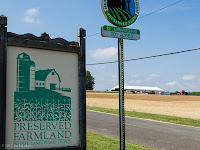NJ has among the highest average cropland prices per acre in the nation–$13,000 and up–way up–and more than half of all NJ farmland is owned by non-farming investors. In fact, about 80% of the value of an acre of NJ cropland is 'speculative,' and only 20% is agricultural value, even when purchased and operated by existing commercial farms. We know this speculative value is true because pasture land values in NJ are the same as tillable land, while in other regions pasture land values are 1/3 to 1/2 the price of cash cropland.
 Taking land equity costs "off the table" as a barrier to entry for urban fringe farming, using alternative finance and lease opportunities, is key to maintaining working croplands, not just open space. It is a companion to farmland preservation, which does not address urban fringe farming land equity barriers.
Taking land equity costs "off the table" as a barrier to entry for urban fringe farming, using alternative finance and lease opportunities, is key to maintaining working croplands, not just open space. It is a companion to farmland preservation, which does not address urban fringe farming land equity barriers.
All farmers need and depend on land owned by investors. Despite NJ's extremely high cropland values, NJ offers compelling low annual cash farmland rents due to the Farmland Tax Assessment externality requiring non-farm landowners to generate revenues. Did you know you can rent tillable cropland in NJ cheaper than renting cropland in Florida, California, even Iowa, even though land costs are much higher here? This is an opportunity for young farmers, who recognize NJ farmland can be a poor investment decision without a grubstake to invest, while also needing proximity to direct markets.
These are among external economic factors we deal with in farming the urban fringe.
These are among external economic factors we deal with in farming the urban fringe.
Jack Rabin and Brian Schilling
